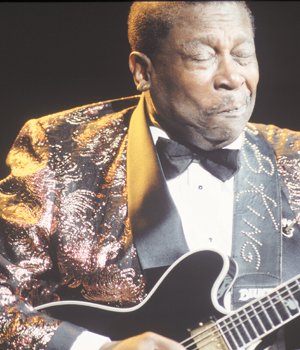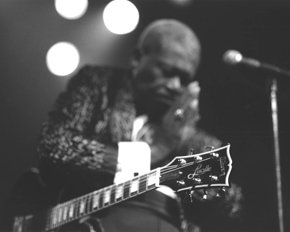
B.B. King Interview B.B. Does DC B.B. Through the Lens
Talk to the Boss: The Blue Note may be the most upscale of expensive jazz and blues clubs in New York and a major stop on the itinerary of world-renowned musicians and the prosperous tourists who adore them. On a cold January night in the restless city, at the opening of a six-day run, there were longhairs in immaculate T-shirts and well-pressed jeans speaking French, tie-wearing young Japanese carrying what appeared to be palm-sized digital video cameras, even a few native New Yorkers for whom the thrill of seeing B.B. King has never gone. From his chair on the small stage in the sub-compact room, the 73-year-old B.B. King could look out at the well-heeled United Nations of blues fans and think, without contradiction: "Lucille, I donít think weíre in Indianola any more." The back-breaking sharecropping of his Mississippi youth must seem a few lifetimes ago. He has performed in 88 countries. B.B. King has wealth; he has respect. He also has hypertension and diabetes, and with that comes the reminder that he does not have the resilience in his legs that he once did. He now sits, rather than stands, onstage. And speaking the next morning in an MCA Records conference room, B.B. King considers that maybe itís time to slow down his relentless pace of performing. "Iím getting older now, so Iím cutting down a bit," B.B. says. "Iím getting to the place where I just canít handle it like I used to, physically." Of course, everything is relative. For a plow horse like King, cutting back means trimming down from the nearly 300 dates he usually performs to the 225 he played in 1998. Heís also trimmed down physically, dropping 40 pounds from his robust frame. "I donít eat sweets, no sugar," he says. "I donít smoke, havenít since I was 25, and donít drink: I had a small bit of cognac for Christmas, hardly a thimblefull. Iíve hardly had a drink of any kind for five or six years or more. Iím also a vegetarian, so I donít have any real bad problems." With a shrug and a smile, he adds: "I donít do everything I should do ó it wouldnít be no fun to live!" The music, as always, retains its warmth, that seemingly contradictory blend of intimacy and majesty that has helped King transcend categories and cultures. At the Blue Note in New York, he sat on the crowded stage just steps above and feet away from the nearest patrons. He crafts his stage patter and set selection to suit the size and nature of the audiences that come to see him. "I think one of the things that has prolonged my longevity is that I try to adjust to the club, not have the club adjust to us," he says. "The Blue Note is known all over the world and is very prestigious, so yeah, I go in there, I play the blues, and I be B.B. King. But I try not to do things that would be out of context with the club. What I would do at B.B. Kingís club on Beale Street I would not do at the Blue Note; and when I leave here and go to the Blue Note in Osaka or Tokyo, I would not do the same as I do at the Blue Note here." One notable aspect of Kingís shows these days is the prominence of his horn section, built around the presence of bandleader and trumpet player James Bolden. Although King is the most revolutionary and influential blues guitarist ever, he has shared the spotlight with horn players since his earliest recordings. "My very first recordings [in 1949] were for a company out of Nashville called Bullet, the Bullet Record Transcription company," King recalls. "I had horns that very first session. I had Phineas Newborn on piano; his father played drums, and his brother, Calvin, played guitar with me. I had Tuff Green on bass, Ben Branch on tenor sax, his brother, Thomas Branch, on trumpet, and a lady trombone player." Kingís infatuation with brass goes back even farther. "Iím kind of from the big-band era,íí he says. "I was crazy about Benny Goodman, I liked Count Basie, Duke Ellington, Jimmy Lunceford and all the big bands that had blues singers with them. Jay McShann had Walter Brown as a singer, Count Basie had Jimmy Rushing, Duke had Al Hibbler, Benny Goodman had Peggy Lee. All those were my favorites. I loved the sound of horns and all of that. I always wanted it, and I always had one or two horns, always."
His innovative musicianship, congenial personality, and international appeal have made B.B. King the Louis Armstrong of his blues generation. Of his travels through 88 countries, he recalls as most memorable a 1979 tour through a Soviet Union still in the insular grip of a hard-line Communist regime. "It seemed that everybody was shy of somebody else," King recalls. "When we got to Moscow, there was this great big hotel, I donít think Iíve ever seen a hotel that large. And they had what we called Ďden mothersí watching you on every floor, to keep you from having anybody come up Ö You definitely couldnít bring no lady up, but they didnít even want you to bring a man. "I remember being in one of the rooms, and one of the guys in the band says to me, ĎHey man, I sure would like a cup of coffee.í And a few minutes later, someone knocked on the door and said, ĎHereís your coffee.í We went through things like that." A little more than two years ago, King and band made their first trip to China, opening what was the worldís largest Hard Rock Cafe. But King found himself thrust into controversy having to do with the appearance (or lack thereof) by a local Chinese guitar hero. "The promoters didnít invite him, and then they laid it on me," King says. "The media said that B.B King did well, but he ignored the number-one guitarist of China. I said, ĎMy God ó I didnít have anything to do with it.í But it was interesting. The club held about 6,000 or 7,000 people inside, and there must have been about 18,000 more outside." Of course, surviving in the music business can mean a lifetime of absorbing misunderstandings with promoters, record companies, lawyers and the rest of the functionaries of "the business." On his latest MCA album, Blues On the Bayou, King is credited as the sole producer because thatís what he was. In the 1950s he also produced many of his own sessions but never got credit. "The company I was with knew a lot of things they didnít tell me, that I didnít learn about until later," King says. "I donít give them a hard time, like some of the guys, who say, ĎThey cheated me!í I think that as long as you do business, if you donít know, theyíre not going to tell you." But King rightfully remains sore about the poaching of half of his music publishing and songwriting royalties during the í50s when he recorded for Joe, Jules and Saul Bihariís RPM, Modern and Kent labels. Look at the writing credits of early King tunes such as "Sweet Little Angel," "Three OíClock Blues," and "Ten Long Years," and youíll see King listed as co-author with names such as Joe Josea, Jules Taub and Sam Ling. "Some of the songs I wrote, they added a name when I copyrighted it," King says today. "Like ĎKing and Lingí or ĎKing and Josea.í There was no such thing as Ling, or Josea. No such thing. That way, the company could claim half of your song." King owes his good and substantial fortune to having teamed up 35 years ago with Sidney A. Seidenberg, his long-time manager. Seidenberg was a certified public accountant who fought (sometimes successfully, sometimes not) to wrest song credit back from bogus "collaborators." The durability of the King and Seidenberg relationship is unusual in an industry as fickle as the entertainment business. "Weíre the same age," B.B. says. "Heíll be 74 in March; Iíll be 74 in September. We have some of the same symptoms, problems with the knees and legs. When we first got together 35 years ago, he told me if I said, ĎSid, give me a dollar,í he would. But if I said, ĎSid, loan me a dollar,í heíd expect me to pay it back. Iím the same way. Weíre the best of friends, and thereís no manager better." Their collaboration continues in Las Vegas, where Seidenberg lives and where King, as he likes to joke, pays rent. "Iíve been there for 23 years. I say I pay rent there," King says of Vegas. "I live on the bus, planes and trains." Despite age and ailments, King has no plans to settle down around a swimming pool in the desert. "In order to keep a band together, and I think Iíve got a very good one, Iíve got to keep work for them," he says. "Keeping them working means I have to work, too." King recognizes that he doesnít have to work if he doesnít want to. "Sid made some good investments for me years ago that have done real well,íí he says. "Iím not rich, but I donít have to do it. Usually, what Sid will do is have a lot of [tentative] dates and say, ĎB, weíve got this set, and next month we can go here, or go there. How much do you think you can do? Can you handle this, can you handle that?í "But I love to play. I enjoy it. And while I used to not care about money at all, today, I love it! I love it! (laughs). So when he tells me, the last time we got 50 cents from this one, this time we get a dollar, I say, ĎYeah, letís get that!í Itís like dangling a carrot in front of Bugs Bunny."
|



